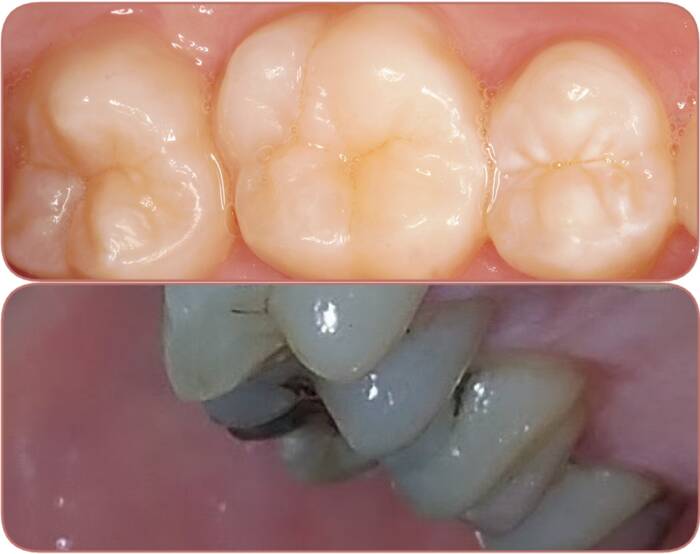Having a black spot on a molar tooth can have several causes, from the most benign to the most serious. Let’s take a look at them and the different ways to remedy them.
I. What Causes Black Spots on a Molar Tooth?
There are several criteria to take into account when it comes to black stains on a tooth. First of all, if the stain is only localized on one tooth, then there is a good chance that it is a necrosis of the pulp.
This is due to a dental cavity that has not been properly treated and has become infected.
Dental necrosis can have other causes. Pulpitis is one of them. It is a condition that affects the root of the tooth. In this case, bacteria grow where the blood vessels that feed the pulp are located.
Physical trauma can also damage the dental pulp. The pulp can then start to rot, changing the color of the tooth which is no longer irrigated. This can be caused by bruxism, for example.
Another cause of dental necrosis is the placement of a post or crown on a living tooth. The treatment can alter the nearby pulp and stop dental vascularization.
Food, especially products rich in tannin such as red wine, can also stain teeth. Tobacco in particular is one of the products that cause the most staining of teeth. It can even turn them black.
Not to mention the use of certain medications, or black tartar.
But generally, these last-mentioned causes attack several teeth and not only one molar tooth.
II. Black Spot on a Molar Tooth, What to Do?
A black spot on a molar tooth is often due to a badly treated cavity. But ideally, it is better to start by consulting a dentist.
You can only really treat your tooth when you know the cause of the pathology.
If it is indeed tooth decay so advanced that the tooth pulp is necrotic, then a root canal is necessary.
This may be the choice your dentist makes to stop the necrosis of your tooth.
A root canal is an operation that removes the dental pulp. Then, to preserve the tooth, a sort of barrier is created to prevent the spread of germs.
Unfortunately, it may happen that the only solution is to extract your tooth. This may be considered if the tooth can no longer be saved.
Tooth extraction is done under local anesthesia. It is one of the most common dental operations. There are different methods depending on the case.
Only after an examination of your stained tooth will your dentist decide what to do.
III. Black Stain on Baby Teeth
Even toddlers can get black stains on their baby teeth.
One of the causes of this phenomenon is hypo calcification of the dental enamel.
When a child has this rare condition, he or she may have one or more stained teeth. The stains can range from brown to black. Hypocalcification is due to a defect in the crystallization of the enamel.
Because of this, the enamel lacks strength, is porous, and is more likely to stain.
There are other causes of black stains on baby teeth.
Infantile melanodontia (enamel dysplasia) is a pathology that causes slow destruction of the enamel. It also manifests itself by milk teeth becoming black, and without treatment can cause their destruction.
Creeping tooth decay is also a pathology that can cause black stains on baby teeth.
This type of decay not only attacks one tooth but also spreads to neighboring teeth. In the case of rampant cavities, you will soon notice a sort of black line tracing a path on several teeth in a row.
Creeping cavities, like normal cavities, are mainly caused by poor oral hygiene. The consumption of sugary and processed foods, combined with irregular brushing, is the cause.
IV. What Are the Aggravating Causes of Black Spots?
The most aggravating causes of black stains on teeth seem to be tooth decay and tooth necrosis.
When tooth decay causes a change in the color of the teeth, it may mean that the decay has spread. It may be a rampant cavity or a cavity that has been neglected and poorly treated for a long time.
At this level, the risk of infection is high, and the blackened tooth may have to be extracted.
Necrosis of the pulp is also a great risk. If the necrosis is advanced, it is possible that the tooth will not be saved.
Thus, if the cause of a black spot on a tooth is due to pulp necrosis, there is a good chance that the tooth will be lost.
In addition, necrosis of the tooth can infect the rest of the mouth.
For these reasons, tooth decay and pulp necrosis are the most dangerous causes of black stains on teeth.

